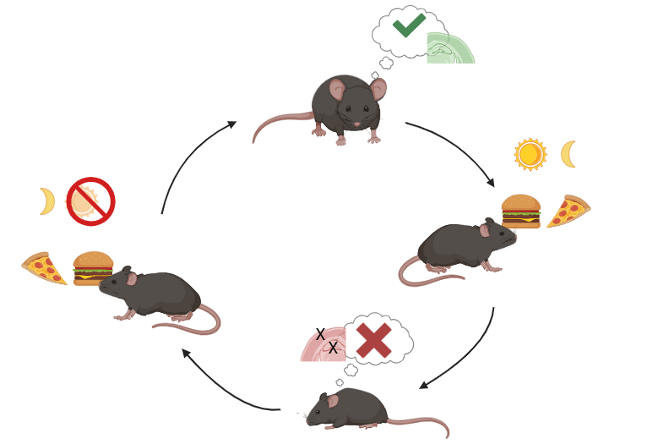Junk food can have radically different effects on the connectivity and coactivation of neural networks necessary for remembering when consumed rationally or at will.
Obesity is on the rise and a major cause of neurological disabilities that is difficult to detect and treat in children and adolescents. This is particularly worrisome because of the lifelong effects that unrestricted snacking on highly caloric food could cause on brain maturation.
Human studies are limited by the size and duration of sampling with low resolution metrics to prove causality between nutritional habits and cognitive health trajectory. Animal studies have shown that all-day snacking on highly caloric food disrupts innate biological rhythms influencing hormonal secretions, neuronal structure and function in brain regions that encode, store and retrieve memories.
The teams “Stress, hormones and plasticity” led par Freddy Jeanneteau (IGF, Montpellier), “Nutrition and Neuropsychiatric Symptom Dimensions” (NutriNeuro, Bordeaux) and “Regulation and disruption of neuroendocrine rhythms” (INCI, Strasbourg) hypothesised that hypercaloric foods could alter neuronal representations of memory depending on the feeding-fasting cycle. In this longitudinal preclinical study during the transition from infancy to adulthood, mice were fed food high in saturated fat and refined sugar around-the-clock or solely during the active period of the day. Primary metrics were cognitive functions, neuronal connectivity, neuroactivity, hormonal resistance and calorimetry. The results indicate that co-activation of the cortico-hippocampal axis necessary for remembering is uncoupled by obesogenic food consumed ad libitum but not on meal scheduling, extending previous neuroimaging correlation studies in adolescents with obesity. Poor nutritional habits caused glucocorticoid resistance altering neuronal allocation in engram networks through severed connectivity. Meal scheduling was sufficient to correct glucocorticoid resistance and to sustain neuronal connectivity within the engram network representation of memory. Researchers used mouse carriers of mutations causing glucocorticoid resistance to mimic the effect of hypercaloric diet and annul the benefits from intermittent fasting. Chemogenetic experiments determined the cause and effect of the amnesic state featuring lesser cortical function mixed with higher hippocampal activity, while the mnesic state required scaling of cortico-hippocampal activities by glucocorticoid signalling.
What and when we eat changes neuronal representations of memory. The findings should be validated in humans before informing health advice and school policy.
This work has just been published in the journal eBioMedicine.

Researchers at the Institut de Génomique Fonctionnelle in Montpellier used in vivo microscopy, engram trapping, pharmacology and chemogenetic interventions during cognitive functioning to test if eating junk food around-the-clock would uncouple the cortico-hippocampal activities supporting remembering. On the other hand, intermittent fasting was used in a sub-group of mice fed junk food ad libitum to determine if the cortico-hippocampal coupling and memory performance could be restored. A disruption of hormonal biorhythms featuring glucocorticoid resistance is a major factor mediating the impact of poor nutritional habits on brain representations of memory.


